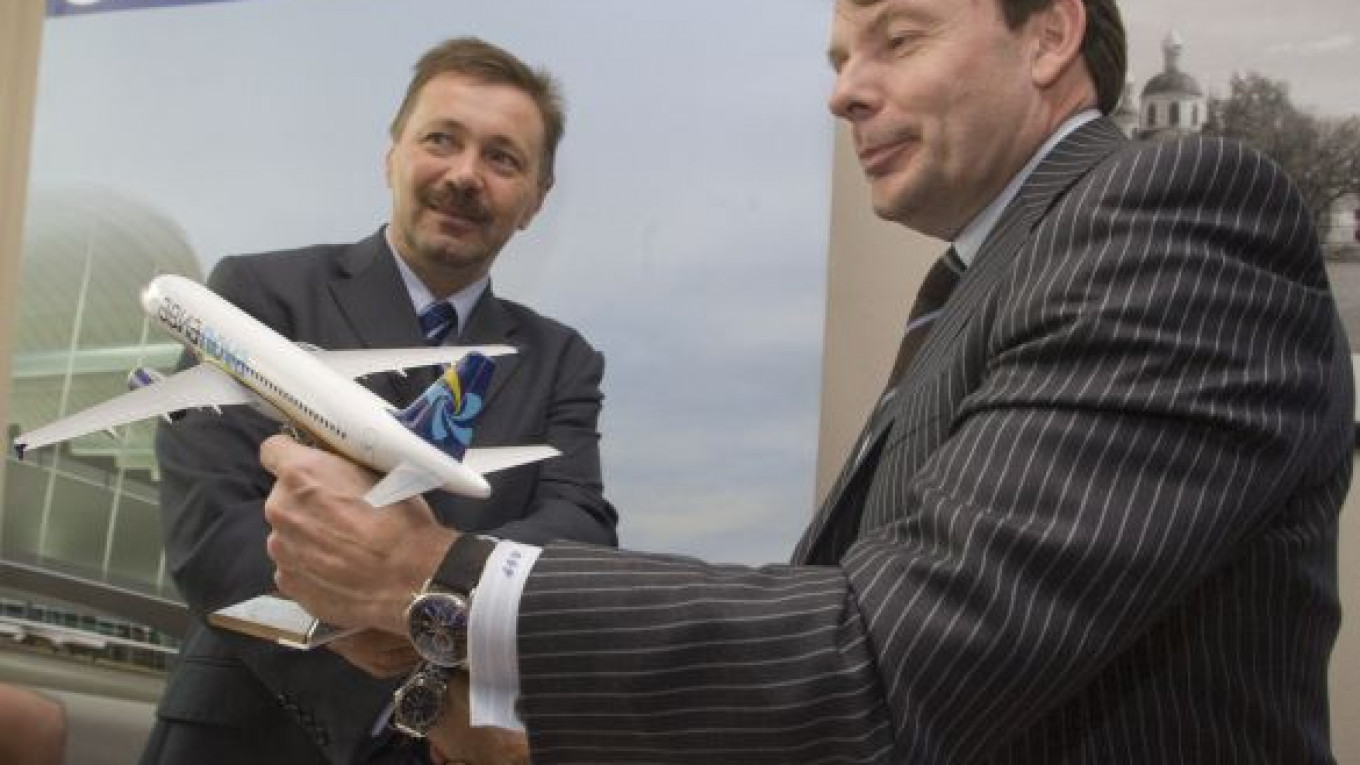Expatriate executives who were locked out of budget airline Avianova's offices last month as a part of an apparent battle between Russian and U.S. shareholders have been accused of managerial incompetence, flouting Russian law and inflicting severe financial damage on the company.
Andrew Pyne, who ran Avianova until he was physically denied access to the offices in June, said the allegations were "laughable and have no factual basis." He added that he was considering legal action.
Avianova, set up in 2009, is 49 percent owned by U.S. venture capital fund Indigo Partners and 51 percent by A1, the investment arm of Mikhail Fridman's Alfa Group, which was recently involved in a bitter tussle with BP, its partner in Russia's third-largest oil company, TNK-BP.
In a statement released Wednesday by Avianova, the company's general director, Vladimir Gorbunov, hired by Pyne after the airline was founded, said Pyne had "demonstrated his unwillingness to work in compliance with Russian laws and emphasized his intention to work solely in accordance with his own rules."
Regulatory agencies had brought repeated legislative violations to his attention, Gorbunov said, so he had been obliged to remove Pyne, along with other Russian and expatriate executives, from their positions within the company.
Pyne, a British citizen who ran Avianova through an offshore company called Whitefish Aviation because foreigners are forbidden to manage Russian airlines, said his exclusion from the company's offices was illegal and he could only be fired with the agreement of all the shareholders.
"This is a shareholder dispute," Pyne told The Moscow Times. "Gorbunov is clearly working to guidelines and instructions issued by one shareholder [A1] against the interests of the other, American, shareholder."
Gorbunov, however, maintained that the company's shareholders were united. "Pyne, removed from cooperation for noncompliance with Russian laws, is misleading the public by misrepresenting his own irresponsibility as conflicts between shareholders," he said in a statement. Gorbunov did not respond to written requests for elaboration late Thursday.
Reached by telephone, the U.S. shareholders, Indigo Partners, refused to comment on the situation. The Russian partners, A1, told a Moscow Times reporter that everybody had left the office and no one was available.
Chief safety officer Guy Maclean, chief commercial officer Michael Hayden and a small number of Russian employees had been barred from the company's offices June 29, said Pyne.
Avianova, which has hired Konstantin Trenin, a Russian airline executive, to take Pyne's place, also alleged that Hayden was responsible for the company's loss of 4.5 million rubles ($160,000).
Hayden, an Irish citizen, told The Moscow Times that these comments were libelous. He said that, since Avianova's "illegal coup," he had been advised by his embassy to leave the country for his personal safety. His wife and three children left Moscow immediately, and he had only recently returned to "pack up the house." His e-mail has been hacked and his phones were tapped, he said.
An Avianova shareholders meeting is scheduled for July 18.
"The only way this can work out is that the Russian shareholders depart. … Either we lose Avianova or we lose A1," Hayden said.
A Message from The Moscow Times:
Dear readers,
We are facing unprecedented challenges. Russia's Prosecutor General's Office has designated The Moscow Times as an "undesirable" organization, criminalizing our work and putting our staff at risk of prosecution. This follows our earlier unjust labeling as a "foreign agent."
These actions are direct attempts to silence independent journalism in Russia. The authorities claim our work "discredits the decisions of the Russian leadership." We see things differently: we strive to provide accurate, unbiased reporting on Russia.
We, the journalists of The Moscow Times, refuse to be silenced. But to continue our work, we need your help.
Your support, no matter how small, makes a world of difference. If you can, please support us monthly starting from just $2. It's quick to set up, and every contribution makes a significant impact.
By supporting The Moscow Times, you're defending open, independent journalism in the face of repression. Thank you for standing with us.
Remind me later.







